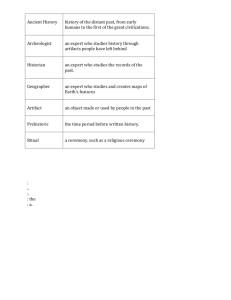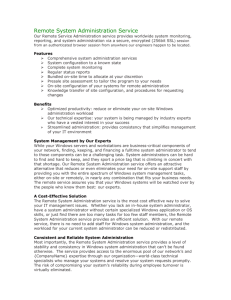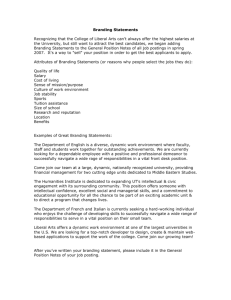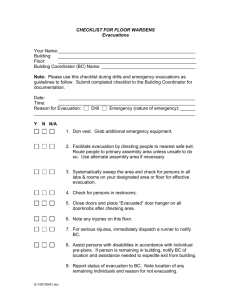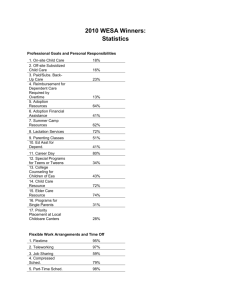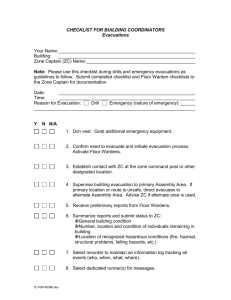H210 Event Operations Management
advertisement
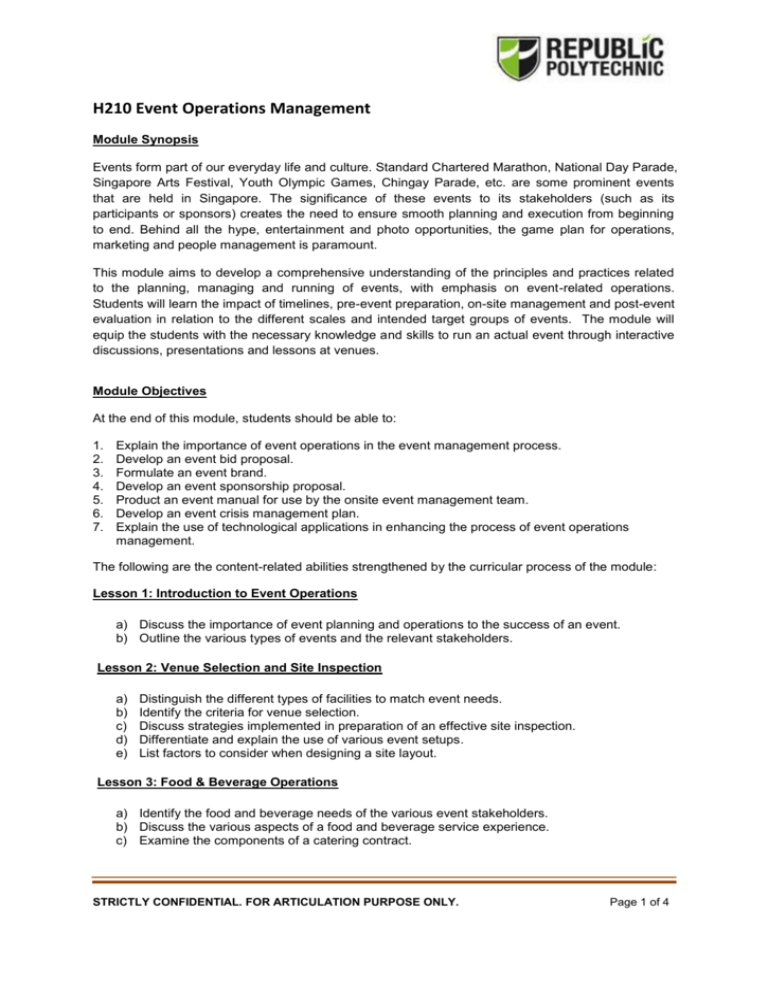
H210 Event Operations Management Module Synopsis Events form part of our everyday life and culture. Standard Chartered Marathon, National Day Parade, Singapore Arts Festival, Youth Olympic Games, Chingay Parade, etc. are some prominent events that are held in Singapore. The significance of these events to its stakeholders (such as its participants or sponsors) creates the need to ensure smooth planning and execution from beginning to end. Behind all the hype, entertainment and photo opportunities, the game plan for operations, marketing and people management is paramount. This module aims to develop a comprehensive understanding of the principles and practices related to the planning, managing and running of events, with emphasis on event-related operations. Students will learn the impact of timelines, pre-event preparation, on-site management and post-event evaluation in relation to the different scales and intended target groups of events. The module will equip the students with the necessary knowledge and skills to run an actual event through interactive discussions, presentations and lessons at venues. Module Objectives At the end of this module, students should be able to: 1. 2. 3. 4. 5. 6. 7. Explain the importance of event operations in the event management process. Develop an event bid proposal. Formulate an event brand. Develop an event sponsorship proposal. Product an event manual for use by the onsite event management team. Develop an event crisis management plan. Explain the use of technological applications in enhancing the process of event operations management. The following are the content-related abilities strengthened by the curricular process of the module: Lesson 1: Introduction to Event Operations a) Discuss the importance of event planning and operations to the success of an event. b) Outline the various types of events and the relevant stakeholders. Lesson 2: Venue Selection and Site Inspection a) b) c) d) e) Distinguish the different types of facilities to match event needs. Identify the criteria for venue selection. Discuss strategies implemented in preparation of an effective site inspection. Differentiate and explain the use of various event setups. List factors to consider when designing a site layout. Lesson 3: Food & Beverage Operations a) Identify the food and beverage needs of the various event stakeholders. b) Discuss the various aspects of a food and beverage service experience. c) Examine the components of a catering contract. STRICTLY CONFIDENTIAL. FOR ARTICULATION PURPOSE ONLY. Page 1 of 4 Lesson 4: Feasibility Study and Event Proposal a) Identify the fundamental elements of an event framework. b) Describe the event bidding process. c) Design an event proposal. Lesson 5: Event Team Structure and Timeline a) Identify members of an event team and describe their respective roles and characteristics/skills required. b) Discuss the significance of teamwork and factors contributing to a productive team. c) Discuss how an event timeline and checklist can aid in the planning process. d) Prepare an event timeline and checklist. Lesson 6: Event Branding a) Explain the importance of event branding. b) Develop a creative event theme that supports the event objectives. c) Discuss the customization of event branding in publicity mediums like collaterals and websites. Lesson 7: Event Budgeting a) Discuss the importance of event budgeting. b) Discuss the role of event operations in event budget management. c) Identify the basic components of an event budget and prepare a simple budget. Lesson 8: Event Sponsorship a) Explain how sponsorships help in funding an event. b) Develop an event sponsorship proposal. Lesson 9: Opening Ceremony and Supplier Management a) Discuss the various considerations when planning an opening ceremony. b) Discuss the role of emcee and prepare an emcee script. c) Prepare cue sheet for opening ceremony. d) Discuss the entertainment booking procedures and performers’ guidelines. e) Describe the various steps in the supplier selection and management process. Lesson 10: Audio Visual Operations and Production Management a) Discuss the needs and impacts of audio visual operations on events. b) Identify the relevant equipment used in an audio visual setup for an event. c) Identify the members in a technical production team. d) Discuss the various aspects in stage management and production in an event. Lesson 11: Finalizing On-Site Operations a) Discuss the important steps to finalize details in event operations, before onsite execution. b) Prepare an event manual. c) Prepare the contingency plan for an event. d) Plan and prepare an event running order. e) Design an evaluation form. Lesson 12: On-Site Event Execution and Crisis Management a) Identify the different activity areas for supervision during setup. b) Discuss the importance of rehearsals in ensuring smooth event operations. c) Discuss on-site staff management in an event. d) Identify the types of crises in events. e) Discuss the importance of crisis management. f) Develop a crisis management plan. STRICTLY CONFIDENTIAL. FOR ARTICULATION PURPOSE ONLY. Page 2 of 4 Lesson 13-14: JIVE FIESTA and Post event evaluation and report of JIVE FIESTA a) Evaluate the importance and purpose of post-event evaluation and report. b) Discuss and assess the event evaluation tools used in post-event evaluation. c) Identify the basic components of a post-event report and prepare a post event report. d) Examine the steps in conducting a post-event meeting. Week 15: IT applications in events a) Identify the latest IT applications used in events. b) Discuss the importance of the use of IT applications in event planning. c) Describe the role of IT in event operations. STRICTLY CONFIDENTIAL. FOR ARTICULATION PURPOSE ONLY. Page 3 of 4 Module Coverage 1. Introduction to Event Operations Allocated time per day (One-Day-One-Problem PBL Pedagogy) Discussions in Resource Site Visit/Event Study Cluster Gathering and Execution Team Work 4 2 - 2. Venue Selection and Site Inspection 4 2 2 3. Food & Beverage Operations 4 2 - 4. Feasibility Study and Event Proposal 4 2 - 5. Event Team Structure and Timeline 6. Event Branding 4 2 - 4 2 - 7. Event Budgeting 4 2 - 8. Event Sponsorship 4 2 - 9. Opening Ceremony and Supplier Management 10. Audio Visual Operations and Production Management 11. Finalizing On-Site Operations 4 2 - 4 2 2 4 2 - 12. On-Site Event Execution and Crisis Management 13. Execution of JIVE Fiesta 4 2 - 4 2 4 14. Post event evaluation and report 4 2 - 15. IT applications in events 4 2 - 60 30 8 Total = 15 Problems = 98 hrs STRICTLY CONFIDENTIAL. FOR ARTICULATION PURPOSE ONLY. Page 4 of 4
